#Farrell comic books
Photo
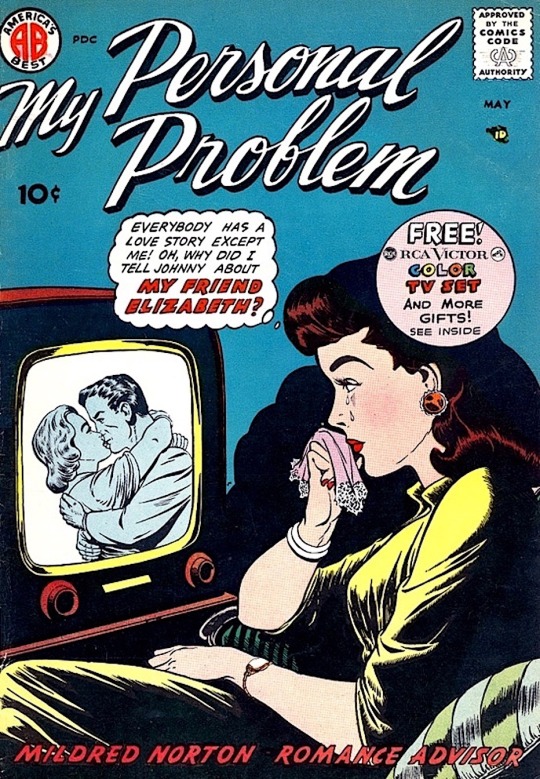
(1958)
#My Personal Problem#comic book#1958#vintage#romance comics#Iger Shop#cover art#television#1950s#Farrell comic books#TV#love story
102 notes
·
View notes
Text
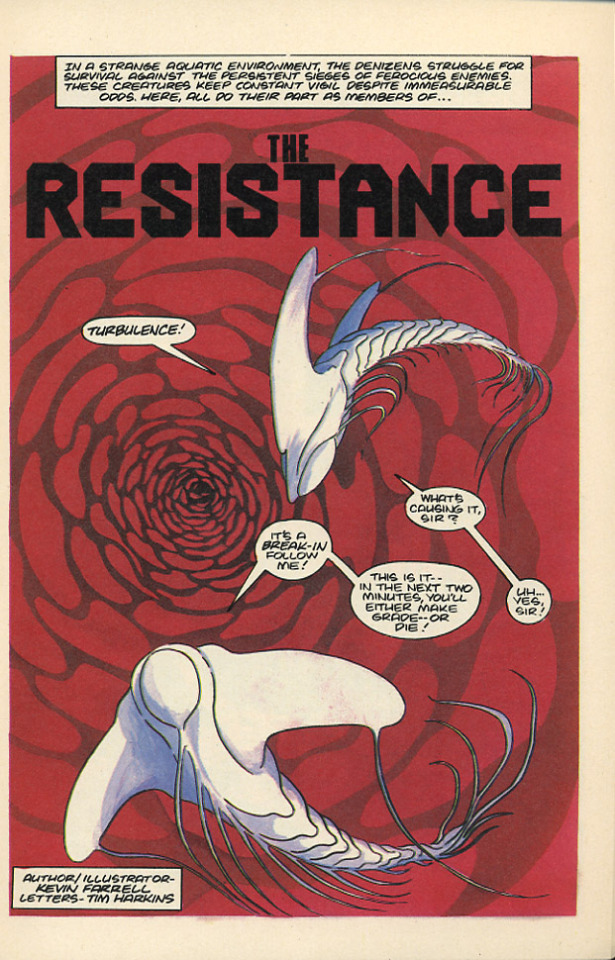
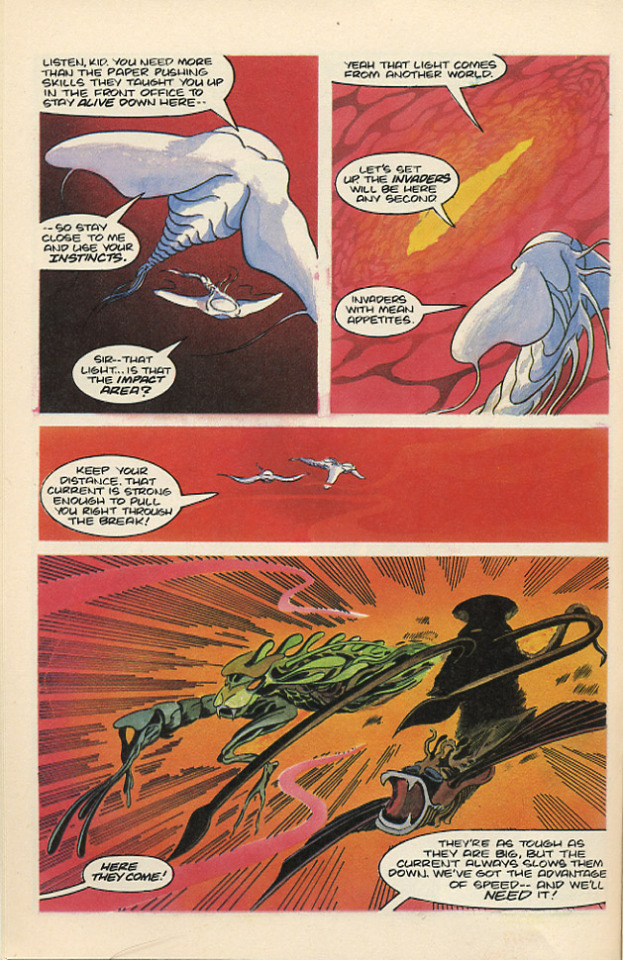

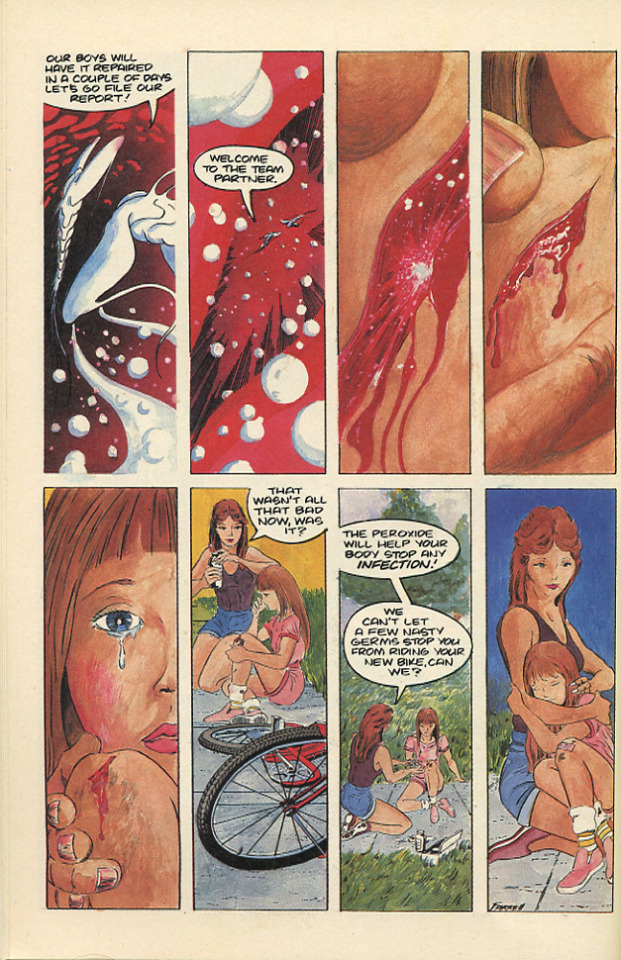
Alien Encounters #2: The Resistance
by Kevin Farrell and Tim Harkins
Eclipse
97 notes
·
View notes
Photo
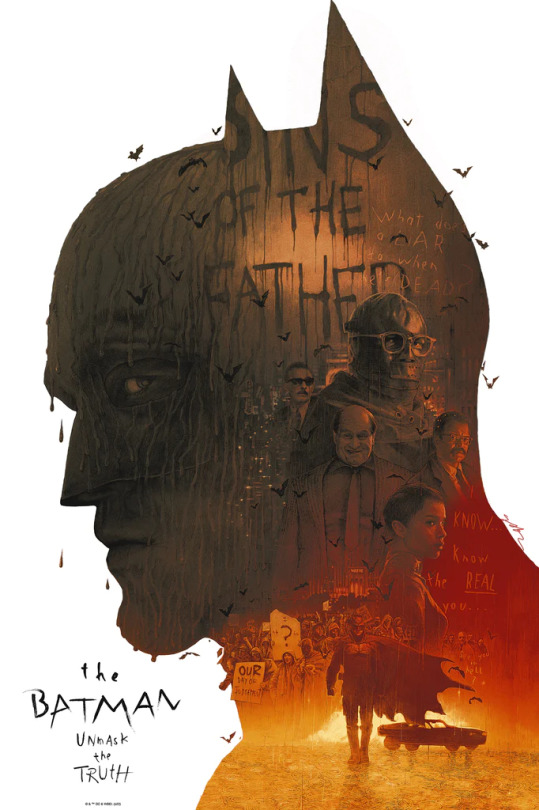
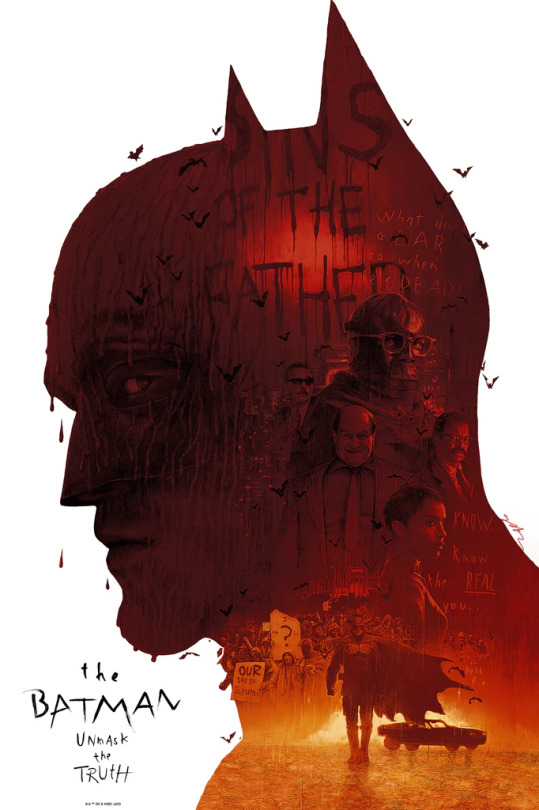
Bottleneck Gallery will release The Batman 24x36 screen prints by Gabz today, December 15, at 12pm EST. The standard edition (left) is limited to 200 and costs $50, while the variant is limited to 100 and costs $60.
#the batman#batman#robert pattinson#matt reeves#dc comics#bottleneck gallery#gabz#art#gift#bruce wayne#zoe kravitz#paul dano#colin farrell#jeffrey wright#comic book movies
98 notes
·
View notes
Photo
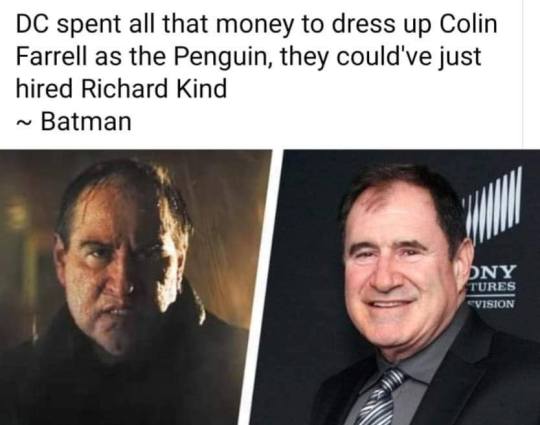
#funny#humor#batman#the penguin#colin farrell#richard kind#actors#celebrities#hollywood#filmmaking#superheroes#comic books#dc comics#dc universe
63 notes
·
View notes
Photo

Coming in February 2023 from Vault Comics:
GODFELL #1
Writer: Christopher Sebela
Artist: Ben Hennessy
Colorist: Triona Farrell & Vittorio Astone
Letterer: Jim Campbell
Cover A: Ben Hennessy
Cover B: Nathan Gooden
Synopsis: One sunny day in the land of Kerethim, God falls dead from the sky. The impact sends out shockwaves that draw in royal families at war, shadowy creatures of the dark, and armies of the dispossessed, all coming to lay claim to parts of God’s body. Into this power struggle wanders Zanzi Vuiline, a soldier and berserker trying to get home from a years-long war. Forced to fight her way through the strange landscapes in and on God’s corpse, from the soles of its feet through the top of its head, Zanzi will acquire a mysterious traveling companion on her own pilgrimage.
#vault comics#godfell#christopher sebela#ben hennessy#triona farrell#vittorio astone#jim campbell#comics#comic books
12 notes
·
View notes
Text

Knight Terrors - Harley Quinn #1
Dawn of dc
DC
#Harley Quinn#Knight Terrors -#Harley quinzel#dc comics#comics#cover comics#sci fi#comic books#dc#batman#multiverse#multiversity#Harley queen multiversity#horror#horror comics#terror#tini howard#hayden sherman#triona farrell
2 notes
·
View notes
Text
I'm here... Again!
I need people to follow!
I'm Italian, I'm a nurse and I'm in love with:
Star Wars
Star Trek
Adam Driver
Colin Farrell
Michael Fassbender
Stephen King
David Lynch
F1
Rugby
U2
Rammstein
P!nk
Robbie Williams
Cinema, tv shows, books, comics, music, rpg...
#comic books#star wars#star trek#adam driver#colin farrell#michael fassbender#rugby#f1#stephen king#cinema#tv shows#rpg#gdr#italian#nurse#rammstein#u2#p!nk#robbie williams#follow
7 notes
·
View notes
Text

Adding more details to the face and shirt because i just can’t help it. On to #catwoman nxt? #thebatman #batman #penguin #colinfarrell #robertpattinson #DC #dccomics #dceu #painting #illustration #sketch #drawing
#art#painting#illustration#drawing#dc#batman#procreate#comics#dc comics#marvel#digital art#draw#digital painting#sketch#dccomics#dc entertainment#artist#digital illustration#comic books#colin farrell#robertpattinson#the batman#penguin
7 notes
·
View notes
Text
Detective Comics #1081 Kicks off Act Three of Gotham Nocturne
Detective Comics #1081 Kicks off Act Three of Gotham Nocturne and still stands as one of the most fascinating titles out of the Batman office #comics #comicbooks
In Detective Comics Issue #1081, Batman lies between the realms of life and death in the desert after the Orghams attempt to hang him in Gotham City. Still possessed by the Azmer demon, Bruce must figure out the reality from the fiction of who he is while traveling through the desert. However, Bruce is not alone, as one of his greatest enemies taunts him and wants to delve his mind into the world…

View On WordPress
#comic books#Comics#dan watters#dc comics#detective comics#featured#hayden sherman#lee loughridge#ram v#ram v.#Riccardo Federici#stefano raffaele#steve wand#Tom Napolitano#triona farrell
0 notes
Text
The dark superhero pic ‘Daredevil’ starring Ben Affleck opened in theaters this day 20 years ago. 🕶️🦯👊🏼
“𝙷𝚎𝚢, 𝚝𝚑𝚊𝚝 𝚕𝚒𝚐𝚑𝚝? 𝙰𝚝 𝚝𝚑𝚎 𝚎𝚗𝚍 𝚘𝚏 𝚝𝚑𝚎 𝚝𝚞𝚗𝚗𝚎𝚕? 𝙶𝚞𝚎𝚜𝚜 𝚠𝚑𝚊𝚝? 𝚃𝚑𝚊𝚝'𝚜 𝚗𝚘𝚝 𝙷𝚎𝚊𝚟𝚎𝚗... 𝚝𝚑𝚊𝚝'𝚜 𝚝𝚑𝚎 𝙲 𝚝𝚛𝚊𝚒𝚗!”
#otd#2002#20#movies#comic book#marvel#fox#mark steven johnson#ben affleck#daredevil#michael clarke duncan#colin farrell#jennifer garner#joe pantoliano#kevin smith#jon favreau#david keith#stan lee#ellen pompeo#leland orser#frank miller#Spotify
1 note
·
View note
Text


Mech Cadet Yu by (W) Greg Pak (A/CA) Takeshi Miyazawa; Triona Farrell and Simon Bowland
BOOM! Studios
16 notes
·
View notes
Text
'The Batman" Movie and 4K/Blu-ray Review
‘The Batman” Movie and 4K/Blu-ray Review
The following review was written by Ultimate Rabbit correspondent, Tony Farinella.
I have stated in the past I’m not the biggest fan of superhero/comic book films. I know they are insanely popular, and they make up most of the current box office these days. However, they have never quite tickled my fancy. A recent exception to the rule would be 2019’s “The Joker.” It was my favorite film of…

View On WordPress
#2022 Movies#4K#4K Ultra HD#6th and Idaho#Andy Serkis#Blu ray#Colin Farrell#Comic Book Movies#DC Comics#DC Films#Dylan Clark Productions#Gotham City#Jeffrey Wright#John Turturro#Matt Reeves#Paul Dano#Peter Craig#Riddler#Robert Pattinson#Seven#Superhero Movies#The Batman#The Joker#Tony Farinella#Warner Brothers#Zoe Kravitz
1 note
·
View note
Photo

Out this week: Rogues’ Gallery #1 (Image, $3.99):
Hannah Rose May, Justin Mason, Triona Farrell and Declan Shalvey tell a Purge-like horror tale featuring a disenfranchised TV superhero actress whose home is invaded by an unhinged group of intruders cosplaying as her day job’s archvillains.
See what else is arriving in comic shops this week.
#can't wait for comics#comics#comic books#new comics#new comics wednesday#new comic book day#new comics day#ncbd#image comics#rogues gallery#hannah rose may#justin mason#triona farrell#declan shalvey
3 notes
·
View notes
Text
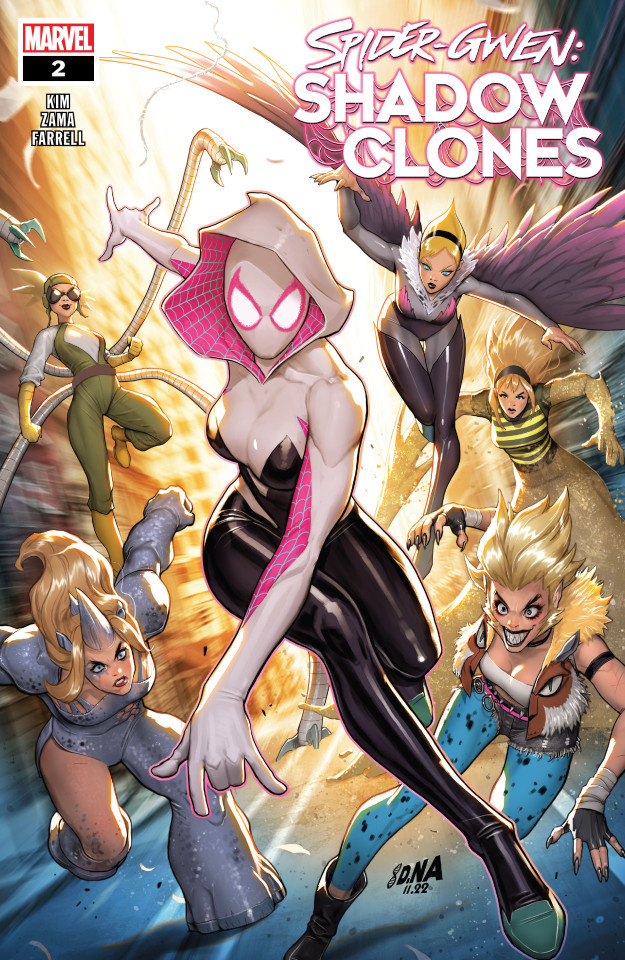
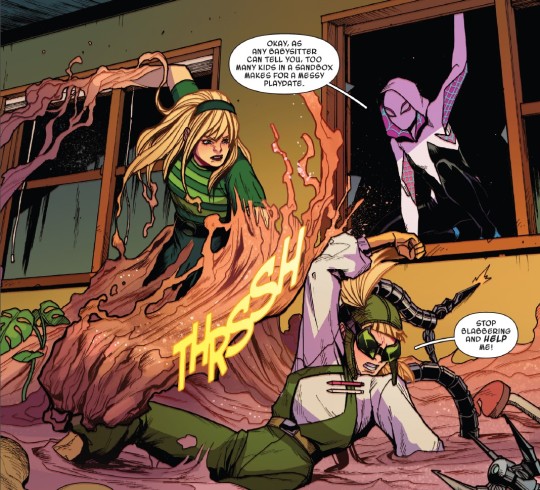



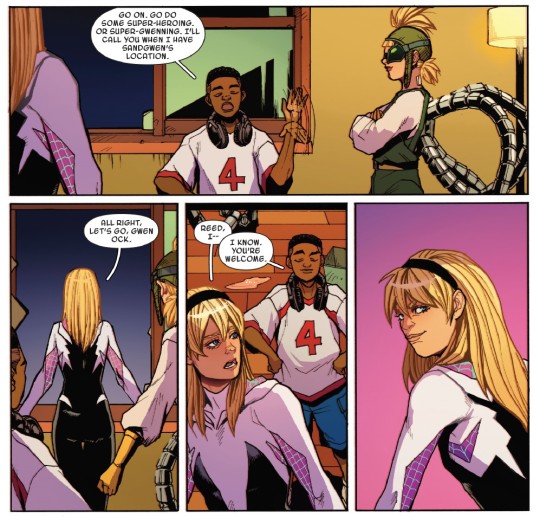
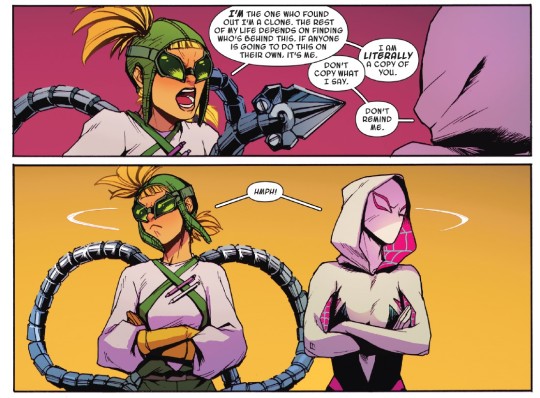

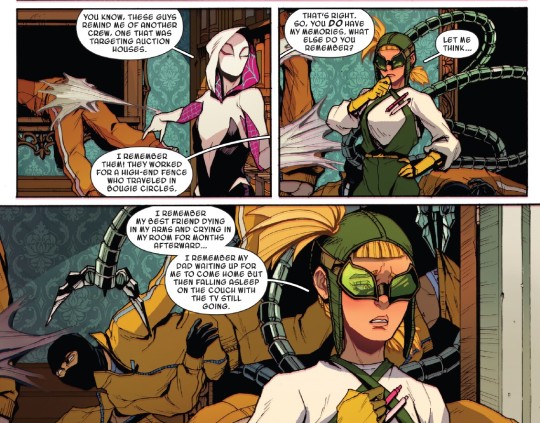
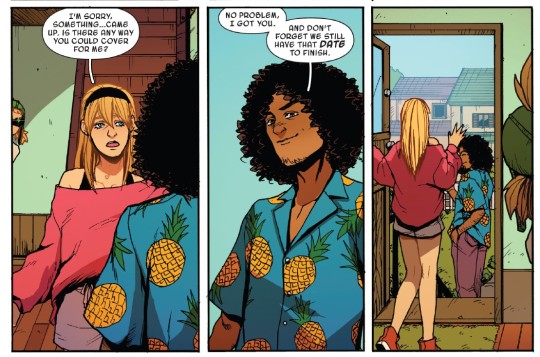
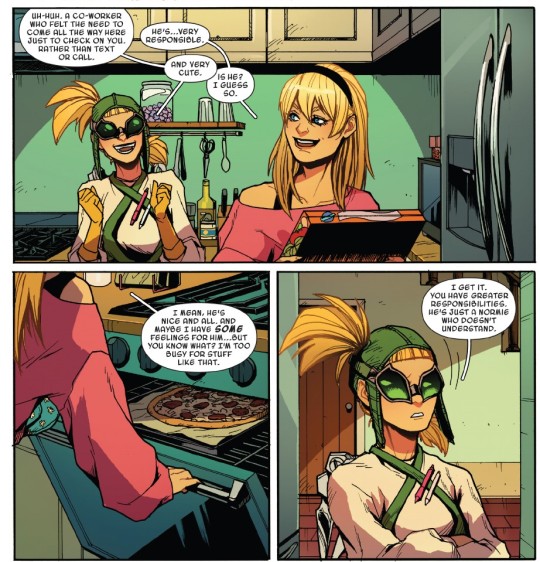
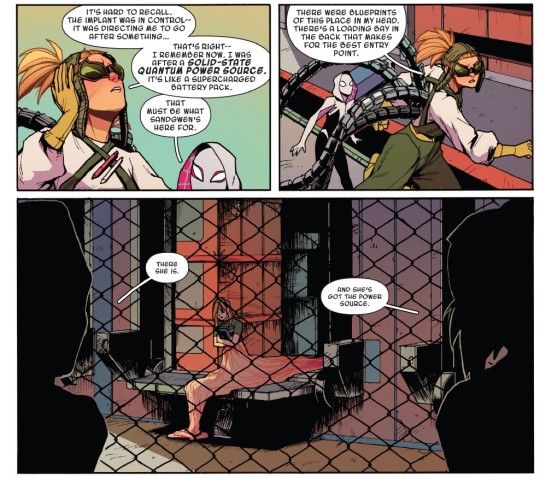
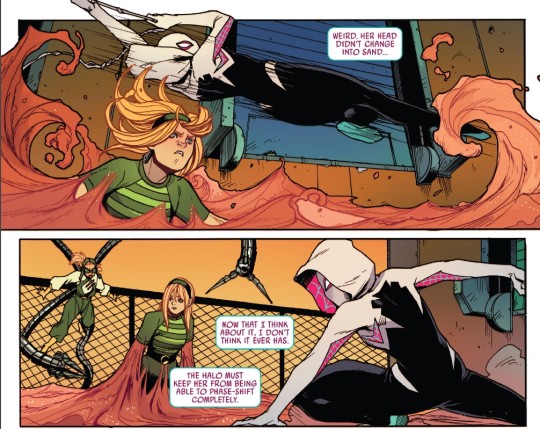
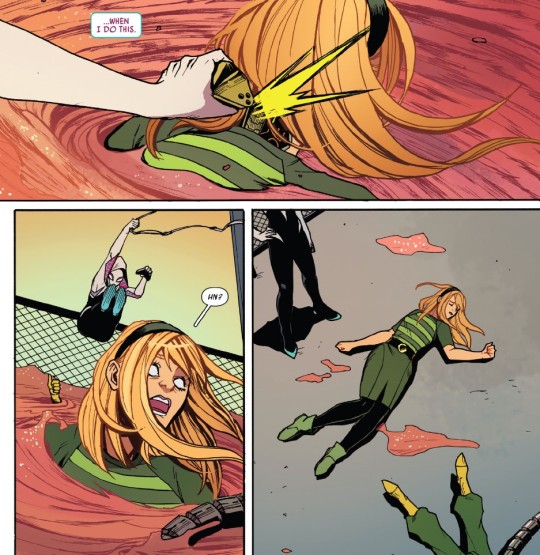
Spider-Gwen: Shadow Clones #2 (2023)
Marvel
#Spider Gwen#gwen stacy#Spider-Gwen#spider verse#spider man#comics#comic books#marvel#Marvel comics#comics cover#cover comics#Gwen#David Kanayana#Emily Kim#Kei Zama#triona farrell
5 notes
·
View notes
Note
thoughts on the Penguin trailer ?

Still have a hard time believing this is happening and that Penguin is somehow gonna be the first comic book villain to get essentially TWO tv shows with him as the protagonist. Not bad, Ozzie, not bad at all.
Very glad to see his limp is more pronounced this time around, that's one of my favorite modern additions to the character. I like the gold teeth as well, they compliment his wretched grin quite nicely.
I have some hesitations regarding this teaser though mainly because Gangster Penguin is in general a concept I have some very mixed opinions of. This is very clearly aiming for that serious Prestige TV Gangster Show vibe, and that can be a bit hit or miss.
I think a lot of what's gonna make or break this show for me is how they paint the world around Penguin and how he contrasts from it. Because part of what works about this Penguin is that, besides the Tony Soprano and Fredo-becomes-Scarface of it all, they made his personality citing the likes of Bob Hoskins and Sydney Greenstreet to make him "a throwback Warner Bros gangster", which means he's quite a few steps removed from being anything like a "real" gangster. He is as much of a gangster as the old version of Penguin was a gentleman thief and swashbuckling nobleman, which is to say, he very much wants to be and can even pull it off in spades, but he's Oswald Cobblepot, awkward farcical counterpart to the actual main character of this world, so he's not quite there the way he would like to be.
The movie plays this that contrast a bit by setting Oz as the loudmouth movie gangster sidekick to Falcone, played to a far, far more chilling and real menace by John Turturro, and the show seems to be following suit with Sofia Falcone playing a "normal" crimelord opposite Oswald. The Falcones are generally incurably boring characters but I think this is a smart choice, making it so that the show's setting and supporting cast make Oswald stand out as uniquely bizarre (compared to the movie, where he was never going to top Batman and Riddler in that regard).
Sofia Falcone is not the hottest Batman woman of all time a giant who strangles cops as a kinder alternative to crushing their skulls like soda cans between her forearms, and therefore there's really no point whatsoever to adapting her. But unfortunately I'm gonna have to declare myself a Tumblr heretic and point out that the giant murdery lady might have not been the best choice here at this moment in time, if this show is gonna play on the idea of Penguin as a unique aberration among the regular mobsters trying to stop him.
Worst case scenario, assuming The Batman somehow was just a fluke, is that this is gonna be a fairly boring nothing of a spin-off focused on uninteresting gangsters warring it out and largely held together by Colin Farrell being a hoot. The more optimistic case scenario is that this is gonna be more of The Batman and The Batman's Penguin, which means this is gonna obviously rule, and best case scenario it might be, against the odds, a really, really good Penguin show, because so far, this is a really, really good version of The Penguin.
What they seem to be doing is zeroing in on Oswald's core as a hedonistic social climber with an almost perfect oily charm punctured with insecurities and self-loathing so strong they warp all the way around to an almost-maniacal overconfidence, spitefully driven to prove himself and take what he wants before a world that repeteadly puts him down as unworthy and lesser ("Da world aint built fer guys like us") and who almost succeeds enough to stop living in almost-weres for good. A Penguin who is both this laughably over-the-top waddling freak who gets into pissing contests with the Batmobile and this miserably human figure whose anger and bitterness comes from a deeply understandable place as a lifetime victim of ableism and violence.
They're taking this ridiculous loud parody of a person and infusing that with unexpected complexity, tragedy and grandiosity so the disconnect and contrast makes the character as intriguing to follow as he is fun to watch, a posturing and even pitiful jolly man who gives you a jolly shank between the ribs with unrelenting menace the second you start getting cozy to his charm and forget how dangerous and clever he is. Of course they have to give this guy a show, because that's The Penguin and The Penguin rules.

“He could have that mix of being incredibly, incredibly scary and volatile, and then all of a sudden, you’d see this vulnerable side that really made you feel for that guy". “So I really wanted him to play the character."
The idea of getting to do the series and really sort of dive into the depths of who this character is and look at that moment where it’s kind of his Scarface moment. The moment where everyone’s underestimated him, he’s gonna reach for power in Gotham - Matt Reeves
You see that face and it's got, so much history, so much pain, so much violence in it
[Matt Reeves] mentioned Fredo to me, because Fredo's crippled by the insignificance that he lives with. There is a kind of fracture at the core of Oz, which fuels his desire and his ambition to rise within this criminal cabal. Where that rise goes … - Colin Farrell
@davidmann95 brought up an idea they might be touching on, which is that in this setting, the Gotham mafia spent 20 years running the city with GTA cheat codes for Infinite Wayne Money, and Oswald happens to be stepping up to take power right at a time when they've been downgraded to a normal mob vying for power in a broken city where that's no longer gonna be the dominant power structure moving forward, because Batman defeated crime by cutting off the crime allowance and that's how we're getting super-crime times two with Clayface and/or Mr Freeze in Part 2.
They also have an Arkham show in development that further cements that changing structure of the rogues and freaks taking over, and so it's possible that this show is gonna be about what happens opposite that, the Gotham mobs trying to ride the tide with Surfing Jokers closing in and the two Falcone Juniors left in town racing to see who gets to be captain of the Titanic.
And this is getting even more into wishful thinking territory, but given how they intend to characterize Penguin in the ways he very much doesn't fit in seamlessly where he wants to and so has to claw and scrape and struggle his way there, and given that he's obviously gonna stick around where as Sofia Falcone and Sal Maroni and etc are all pretty much sealed,
And given how this universe is eever so slightly working it's way into more closer-to-comics elements such as Clayface and Mr Freeze, Arkham Asylum as a gathering hotbed of rogues, and Robin (which both Reeves and Pattison expressed a desire in adapting), it's possible then that the show is gonna be about Penguin becoming a [BIG SHOT] by adapting with the times and thus surviving them, unlike the other mobsters, and so becoming ever so slightly more like his comics self. They did say that Oswald is greatly ambitious and with big plans for the city, that he's capable of taking over power, and that the show is about him moving up from flunky to kingpin, so who's to say he's not gonna have to get creative?
And so what should have been routine business for Sofia and Maroni thrown off the rails by the intrusion of our laughing snorting Simpsons crimelord protagonist, just some weird oily nightclub manager that held Falcone's umbrella up until the city turned upside down and now he's somehow kicking their asses amidst his personal journey of figuring out that being a Godfather / Sopranos extra isn't gonna cut it anymore with all these Bat and Riddle Freaks blowing things up, and so Dah Nu Kengpeen of Gotdam becomes the rocket-powered umbrella genius stealing the seats of power from the kingpins-that-would-be while shouting PENGUIIIN!!! I GOTTA WIIIIIINNNN!!!

Well okay probably not the last part, but I think we're gonna be in for a good time with Mr.Boniface regardless.
#replies tag#batman#dc#the batman#the penguin#oswald cobblepot#matt reeves#colin farrell#penguin#dcu
63 notes
·
View notes
Text
‘M*A*S*H’ at 50: War Is Hell(arious)
Five decades ago, “M*A*S*H” anticipated today’s TV dramedies, showing that a great comedy could be more than just funny.

“M*A*S*H,” which debuted in September 1972, feels both ancient and current. With Jamie Farr, seated, and, from left, Mike Farrell, David Ogden Stiers, Alan Alda, Loretta Swit, Harry Morgan and William Christopher in a later season.Credit...CBS Photo Archive/Getty Images
By James Poniewozik
Sept. 16, 2022 Updated 10:59 a.m. ET
The pilot episode of “M*A*S*H,” which aired on Sept. 17, 1972, on CBS, lets you know immediately where and when you are. Sort of. “KOREA 1950,” the opening titles read. “A HUNDRED YEARS AGO.”
The Korean War could indeed seem a century away from 1972, separated by a gulf of cultural change and social upheaval. But as a subject, it was also entirely current, given that America was then fighting another bloody war, in Vietnam. The covert operation “M*A*S*H” pulled off was to deliver a timely satire camouflaged as a period comedy.
The year before, CBS had premiered Norman Lear’s “All in the Family,” a battlefield dispatch from an American living room. But “M*A*S*H” was another level of escalation, sending up the lunacy of war even as Walter Cronkite was still reading the news about it. The caption acknowledged the risk by winking at it: Who, us, making topical commentary?
Today, “M*A*S*H” also feels both like ancient history and entirely current, but for different reasons.
On the one hand, in an era that’s saturated with pop-culture nostalgia yet rarely looks back further than “The Sopranos” or maybe “Seinfeld,” “M*A*S*H” is often AWOL from discussions of TV history. Sure, we know it as a title and a statistic: The 106 million viewers for its 1983 finale is a number unlikely to be equaled by any TV show not involving a kickoff. But it also gets lost in the distant pre-cable mists, treated as a relic of a time with a bygone mass-market TV audience and different (sometimes cringeworthy) social attitudes.
Yet rewatched from 50 years’ distance, “M*A*S*H” is in some ways the most contemporary of its contemporaries. Its blend of madcap comedy and pitch-dark drama — the laughs amplifying the serious stakes, and vice versa — is recognizable in today’s dramedies, from “Better Things” to “Barry,” that work in the DMZ between laughter and sadness.
For 11 seasons, “M*A*S*H” held down that territory, proving that funny is not the opposite of serious.

Alda’s Hawkeye was a forerunner of the modern dramedy antihero.Credit...CBS Photo Archive/Getty Images
Off the beaten laugh track
The characters serving in the 4077th Mobile Army Surgical Hospital in Korea were professionals whose vocation was to save lives. But their assignment was to patch up soldiers so that they could return to the front lines and kill other people or get killed themselves. This was the eternal, laugh-till-you-cry joke of “M*A*S*H.”
“M*A*S*H” stepped into, and outside of, a tradition of military sitcoms. “Gomer Pyle, U.S.M.C.” and “The Phil Silvers Show” poked fun at the hardships and hustles of life in uniform; “Hogan’s Heroes,” which preceded “M*A*S*H” from 1965 to 1971 on CBS, was about shenanigans in a Nazi P.O.W. camp. But as for the abominations of war, these sitcoms, like the bumbling Sgt. Schultz of “Hogan’s,” saw nothing.
Only three years earlier, CBS had canceled the successful “Smothers Brothers Comedy Hour” amid controversy over its antiwar stances. But by the early 1970s, even die-hard anticommunists saw Vietnam as a lost cause. Pop culture was changing, too, as evidenced by the success of “All in the Family” and of Robert Altman’s 1970 film “M*A*S*H,” based on a novel by Richard Hooker (the pseudonym of H. Richard Hornberger).
The show’s creators, Larry Gelbart and Gene Reynolds, imagined a version of the story that was more pointedly political than Altman’s dark-comic film, and certainly more so than Hooker’s cheerfully raunchy book.
The staff of the 4077th, mostly draftees, channeled their frustration with their situation into pranks, drinking, adultery and gallows humor. The insubordinate-in-chief was Capt. Benjamin Franklin “Hawkeye” Pierce (Alan Alda), who was dead-serious about surgery and dead-sarcastic about every other aspect of the wartime experience.
Casting Alda as the ensemble’s moral center and chaos agent was key. He could caper on set like the love child of Bugs Bunny and Groucho Marx (Hawkeye would imitate the latter while making rounds with patients). He gave Hawkeye’s flirtations with nurses a bantering lightness (though from a half-century’s distance, they can come across more like straight-up harassment).
But Alda also conveyed Hawkeye’s exhausted spleen, which the doctor poured into letters to his father in Maine, a frequent episode-framing device: “We work fast and we’re not dainty,” he writes in the pilot. “We try to play par surgery on this course. Par is a live patient.”
“M*A*S*H” borrowed bits from its sitcom predecessors. It was a workplace comedy, with a goofy boss, Lt. Col. Henry Blake (McLean Stevenson), and uptight antagonists, like the gung-ho lovers Maj. Frank Burns (Larry Linville) and Maj. Margaret “Hot Lips” Houlihan (Loretta Swit). The staff wrestled with bureaucracy and gamed the system, as when the hyperefficient company clerk, Cpl. Walter “Radar” O’Reilly (Gary Burghoff) mailed a jeep home one part at a time.
But the zaniness came with constant reminders that the realities of war could intrude at any moment, like the incoming choppers ferrying the wounded. The producers pushed CBS to dump the laugh track — what’s a studio audience doing in the middle of a war zone? — and eventually compromised on shutting off the yuk machine during operating-room scenes.
The show earned its belly laughs and its quiet. Even the sitcom-standard high jinks — dealing with the black market for medicine, inventing a fictional officer in order to donate his pay to an orphanage — were forms of protest.
In Season 1’s “Sometimes You Hear the Bullet,” Hawkeye meets a writer friend, doing research on the war, who later turns up on the operating table with a mortal wound. The executive producer Burt Metcalfe told the Hollywood Reporter that a CBS executive said, at the end of the season, that the episode “ruined ‘M*A*S*H.’”
The show would run for another 10 years.
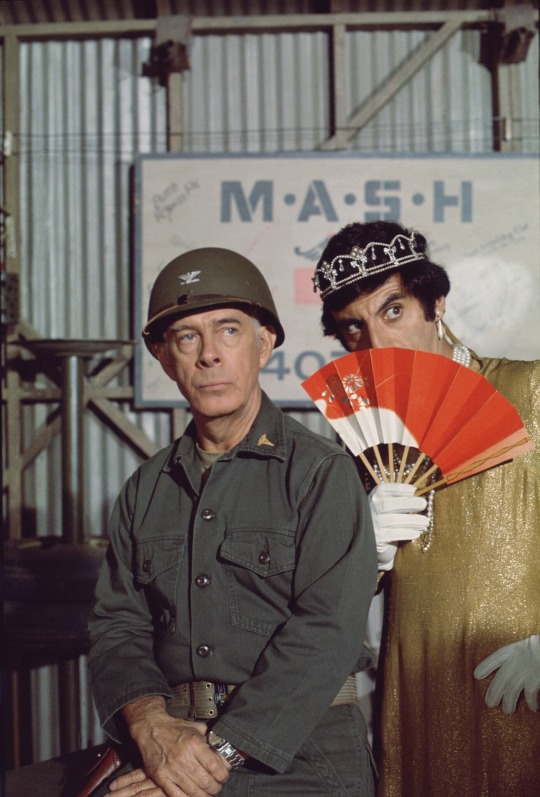
“M*A*S*H” shows its age in various ways, including in a subplot in which Farr’s Klinger sought discharge from the Army by dressing in women’s clothes.Credit...CBS Photo Archive/Getty Images
Comedy meets dramedy
“From any angle, ‘M*A*S*H’ is the season’s most interesting new entry,” the critic John J. O’Connor wrote in The Times in September 1972. Audiences came around in Season 2, after CBS moved the show to a better time slot. It spent most of the next decade in the ratings Top 10 (even as its own timeline hopscotched among different points from 1950 to 1953).
The early seasons worked in a vein of joke-heavy dark comedy, branching out into more story forms and social issues. A Season 2 episode involved a gay patient, decades before Don’t Ask Don’t Tell, who had been beaten up by other soldiers in his unit. (“M*A*S*H” had its share of gay-tinged jokes — as well as a long-running subplot about Jamie Farr’s Cpl. Max Klinger trying to win a discharge by dressing as a woman — but they usually played as banter rather than gay panic.)
Then, in the Season 3 finale, the series exploded a land mine. Stevenson had signed a deal with NBC, and Henry was written off in affectionate sitcom style, with goodbyes and a party. In the episode’s closing moments, Radar — a farm kid who saw Henry as a father figure — walks into the operating room to read a bulletin: “Lt. Col. Henry Blake’s plane was shot down over the Sea of Japan. It spun in. There were no survivors.”
Henry’s death kicked off the series’s peak era, in which it evolved from a lacerating comedy into something closer to what we would recognize today as dramedy.
The new commanding officer, Col. Sherman Potter, was a career Army man, played by Harry Morgan, once Jack Webb’s stoic sidekick in the revival of “Dragnet.” (Morgan played a crackpot general earlier in “M*A*S*H.”) More competent and less malleable than Henry, Potter had a gravitas befitting a show that was growing in ambition.
The Kafkaesque absurdism deepened, too, as in “The Late Captain Pierce,” in which Hawkeye is declared dead in a bureaucratic mix-up and tries to exit the war on a morgue bus. “I’m tired of death,” he says. “I’m tired to death. If you can’t lick it, join it.”
The experimental episode formats became more daring. “Point of View” is shot from the vantage of a wounded soldier whose throat injury renders him mute. In a repeated format, a reporter visits the 4077th for the new medium of television. The unit’s chaplain, Father Francis Mulcahy (William Christopher), described seeing surgeons cut into patients in the winter cold. “Steam rises from the body,” he says. “And the doctor will warm himself over the open wound. Could anyone look on that and not feel changed?”
Just as important, the show evolved its supporting characters, especially Margaret, spoofed as a harpy and sex object in the early seasons. In a Season 5 episode, she vents to her subordinate nurses about the pressures that have made her into the stickler they know. Eventually, she becomes a more complex foil and ally.

Swit and Larry Linville in the first season of “M*A*S*H.” Her character, Margaret, became more complex as the show went on.Credit...CBS Photo Archive/Getty Images
The hilarious but one-dimensional Frank even earns some sympathy before his eventual exit, as Margaret throws him over for a fiancé. He’s replaced by the snobby, intelligent Boston Brahmin Maj. Charles Emerson Winchester (David Ogden Stiers), while Hawkeye’s partner-in-pranks Capt. “Trapper” John McIntyre (Wayne Rogers) makes way for the dry, laid-back family man Capt. B.J. Hunnicutt (Mike Farrell).
Even in the matured version of “M*A*S*H,” a lot has aged badly. A largely male story, it subscribed to the kind of counterculturalism that saw sexual freedom mostly as license for men. For much of the show’s run, various minor nurse characters were so interchangeable that they were repeatedly named “Able” and “Baker” — literally, “A” and “B” in an older version of the military phonetic alphabet.
Ironically, Alda — an outspoken Hollywood feminist and co-star of “Free to Be … You and Me” — became a disparaging shorthand for “sensitive men” among gender reactionaries in the “Real Men Don’t Eat Quiche” era. Late in the show’s run, “M*A*S*H” intermittently interrogated its own attitudes toward women, as in “Inga,” a Season 7 episode with Mariette Hartley as a Swedish doctor whose brilliance Hawkeye finds threatening.
Those later years of “M*A*S*H” could be didactic, and few fans would consider them among its best. The camp got cleaner and the hairstyles suspiciously modern. The show’s heart got as soft and the stories as shaggy as B.J.’s mustache. But the final seasons are interesting as a model for how TV would find ways to tell stories pitched between comedy and drama.
In the movie-length finale, which aired on Feb. 28, 1983, the laugh track, which had been scaled back over the seasons, was gone entirely. And while the scenario — the war finally ended, after three real-life years and 11 TV seasons — yielded the expected sentimental goodbyes and even a wedding, the core story was as dark as any the series had ever done.
Hawkeye is in a psychiatric hospital after a traumatic experience whose repressed memory his psychiatrist, Maj. Sidney Freedman (Allan Arbus), is trying to tease out of him. Hawkeye recalls a carefree day trip to the beach, a bottle being passed around on the bus ride home. Then the booze becomes a plasma bottle; the bus had taken on a group of civilians and wounded soldiers. One Korean woman holds a chicken, whose noises threaten to expose the stopped bus to a passing enemy patrol. Hawkeye urges her to quiet the bird, and she ends up smothering it.
Finally — as you will never forget if you’ve seen the episode — the memory clears: The “chicken” becomes a baby. “You son of a bitch,” Hawkeye says, “Why did you make me remember that?”
Is it melodramatic? Sure. A downer? Of course. It is also, on rewatching, a striking bit of filmmaking for an ’80s sitcom. Hawkeye’s memory unfolds with the uncanny clarity of a dawning nightmare. No music cues you in to the horror; the images just grow more unsettling and the scene more grim. It is, in a way, like the journey of “M*A*S*H” over the years: A romp in the midst of a war zone goes, bit by bit, deeper into night and the heart of darkness.
And 106 million people came along for the ride. A year and a half later, Ronald Reagan, a Cold Warrior who was elected partly on a backlash to post-Vietnam sentiment, won a second term in a landslide. Yet more Americans than voted in that election tuned in to watch a big old liberal antiwar TV show.
After ‘M*A*S*H’
For most of its 11 seasons, “M*A*S*H” was one of TV’s most popular comedies. But its style went mostly unimitated for decades.
It’s not really until the 2000s that you see its heirs emerge. The British version of “The Office” shares its ability to turn from blistering comedy to seriousness. (Stephen Merchant, a creator, has talked about the influence of watching “M*A*S*H” episodes without laugh tracks in Britain.) The mockumentary format of the American “Office” and other comedies hark back to the news-interview episodes (while Dwight Schrute is a kind of Frank Burns of the paper-business wars).
Cable and streaming especially became fertile ground for finding laughs in grim situations. “Rescue Me” made trauma-based comedy in a post-9/11 firehouse, “Getting On” in a hospital geriatric wing. The Netflix prison series “Orange Is the New Black” was as thoroughly female as “M*A*S*H” was dominantly male, but it brought anarchic ensemble humor to a deadly dangerous setting.
In Hawkeye, meanwhile, you can see a forerunner of the modern-day dramedy antihero, charismatic but damaged and driven by anger. As a kid watching “M*A*S*H” reruns religiously, I loved Hawkeye’s rascally wit, his principles and his pranks. (One of my elementary-school music pageants had us sing the theme song, “Suicide Is Painless.” The ’70s were complicated.)
Rewatching episodes as an adult, I enjoy all that still. But he’s also kind of a jerk! He’s self-righteous, attention-seeking, snide and, if you’re on his bad side, a bit of a bully. In a Season 5 episode, Sidney Freedman diagnosed him succinctly: “Anger turned inward is depression. Anger turned sideways is Hawkeye.”
This describes not a few difficult modern dramedy protagonists, human and otherwise. In one of the best episodes of “BoJack Horseman,” built entirely around the self-destructive equine protagonist’s eulogy at a funeral, you can hear the echo of the episode “Hawkeye,” in which Alda’s character, concussed in a jeep crash, spends nearly the full half-hour monologuing manically at a perplexed Korean family, to stave off unconsciousness.
Making serious comedy is a feat of balance, and some might argue that the legacy of “M*A*S*H” was to give sitcoms license to be self-important, unfunny bummers. In a 2009 episode of the TV-biz sendup “30 Rock” — a proponent of the joke-packed school of entertainment if ever there was one — Alda made a tongue-in-cheek version of that critique himself.
Playing the biological father of the NBC executive Jack Donaghy (Alec Baldwin), he witnesses Tracy Jordan (Tracy Morgan), a performer on the sketch-show-within-a-show, crying over the memory of being too “chicken” to dissect a frog in high school, which he’d covered up with a phony story of having been asked by a drug dealer to stab a snitch named “Baby.”
“A guy crying about a chicken and a baby?” Alda’s character says. “I thought this was a comedy show.”
Of course, if you got the joke, it was precisely because “M*A*S*H” did its job. It proved, memorably, that a great comedy could cut deep and leave scars. A half-century later, “M*A*S*H” has had the last laugh, or lack thereof.
153 notes
·
View notes